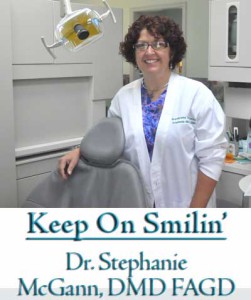By Dr. Stephanie McGann, DMD FAGD, Columnist, The Times
 As a parent, I always want to make things easier for my kids. However, as a dentist, sometimes I see very well-intentioned moms and dads inadvertently make things more difficult. Here’s what you should know.
As a parent, I always want to make things easier for my kids. However, as a dentist, sometimes I see very well-intentioned moms and dads inadvertently make things more difficult. Here’s what you should know.
Don’t promise a reward for good behavior. Most kids have dental visits that are completely free of discomfort and by promising them a reward they are now expecting it to be difficult or scary. Save the treat as a surprise to reinforce a great visit – not as a bribe to get through something terrible. Positive preparation may include reading a story about going to the dentist, using a battery powered spin-type brush to mimic the sounds and feeling of the first dental cleaning or doing a coloring page showing the parts of a dental office. Never give the child a reason for anxiety.
Morning appointments are recommended for apprehensive children. Children who fear the dental visit will spend all day worrying about the visit and have a difficult time. Morning appointments mean less time waiting and a child who is rested and better able to cope with the visit.
If one parent is more comfortable in the dental environment than the other – that’s the parent who should bring the child. If the child has some specific concerns, address them with the team prior to going back into the treatment area.
Have age appropriate expectations. Discuss with your dentist or pedodontist what the expectations are for a first visit. The visit of a 1 year old should be lower expectations than that of a 4 year old. That means for a 1 year old the visit may include an oral screening and a review with caregivers how to perform daily oral hygiene tasks. Once a child is 4, parents should start separating for treatment. A comfortable child is capable of having their teeth cleaned while mom is chatting in the reception area. This makes treatment easier for everyone. Questions for the dentist should be brought up at the beginning of the appointment.
Don’t discuss treatment specifics with your child. When a child asks a direct question about their upcoming visit, tell them to ask the dentist when they get there. The most common two questions are “will it hurt” the best answer is “usually not” the second question is will I get a shot? The answer is “I don’t know for sure, we can ask the dentist before they start.” Not every procedure requires injectable anesthetic, why have a child worry and be upset over nothing. Answer questions matter-of-factly and without concern. If the parent isn’t worried the child won’t be either.
What happens when a child cries? Most children stop as soon as mom or dad leave the room. Early in my dental education (before I had kids of my own), I was surprised at how youngsters were expected to be treated without a parent in the room. I quickly learned that the old adage was true. “The performance stops when the audience leaves.” Many kids actually think they are supposed to be upset at the dentist. When a parent leaves and treatment begins, the dental team can make the experience more comfortable and sometimes even fun.
Repetition breads comfort. If a child has to return for treatment – don’t push to have everything done in one visit. We understand it’s more convenient for a parent to schedule one appointment and get it all done. However for a child with dental needs, multiple short appointments will be less traumatic, less stressful and with a great team the child will actually lose the apprehension. So when the next regular visit comes around, the child may become a comfortable relaxed dental patient for life.
Choose your child’s dentist wisely. Kids thrive with stability, find a practice where your child bonds with the dental team, and feel welcome. Small children are most comfortable in a familiar environment. Unfamiliar surroundings, new people, different ways of doing things all create anxiety in youngsters – find a dental home.
Dr. Stephanie McGann, who has more than two decades of dental practice experience, is a resident of the Unionville area and along with her partner, Dr. Marie Scott, operates The Brandywine Smile Center, a family-friendly dental practice in Concordville. Dr. McGann has opened a new practice in Valley Township, Rainbow Valley Dental. She is a Fellow of the Academy of General Dentistry.






